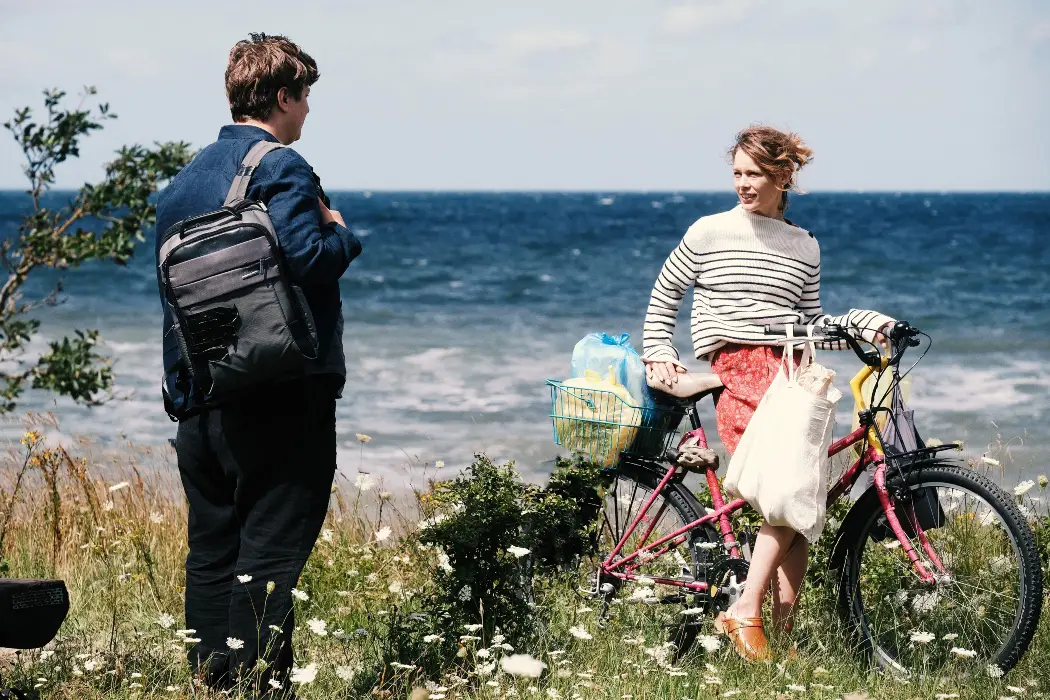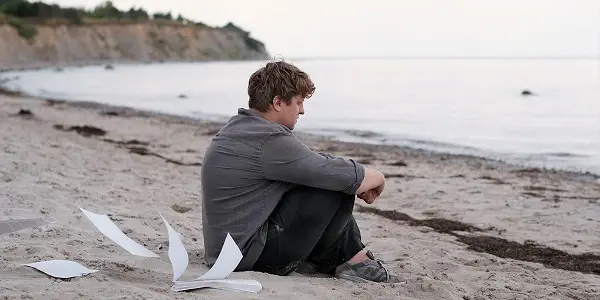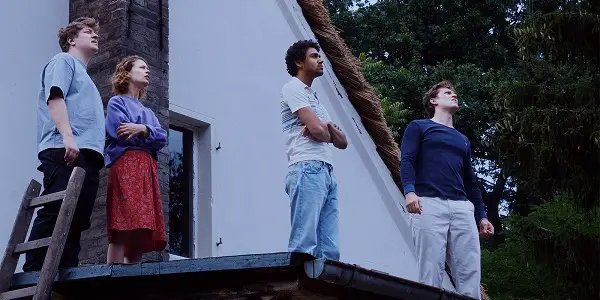AFIRE: Cruel Summer

Lee Jutton has directed short films starring a killer toaster,…
Christian Petzold has followed his romantic tale of a water nymph, Undine, with an equally devastating story focused on a different classical element: fire, and its power to ignite and destroy while also clearing the way for rebirth in the ashes. Winner of the Silver Bear Grand Jury Prize at this year’s Berlin International Film Festival, Afire (also known as Roter Himmel, or Red Sky in German) follows a quartet of young people at a summer retreat near the Baltic Sea as they butt heads, make love, and create art — all as a massive wildfire rapidly approaches and threatens to destroy everything around them. It’s a skillful blend of comedy and tragedy that should only further Petzold‘s reputation as a modern master of the medium.
Summer with Nadja
Leon (Thomas Schubert) and Felix (Langston Uibel) descend upon Felix’s family’s holiday home in the hope of getting some work done without any distractions. For Felix, that means assembling a photography portfolio for art school; for Leon, that means finishing the first draft of his second novel, a task that has consumed his every waking thought to the point of total self-absorption. So, you can imagine Leon’s dismay when the two young men arrive at the house and discover that they’re not alone: a beautiful woman named Nadja (Paula Beer, previously seen in Petzold’s (Transit and Undine) is also staying there while selling ice cream at the beach nearby.

Despite needing to polish up his manuscript before his editor, Helmut (Matthias Brandt) arrives to review it with him, Leon is easily distracted by the lovely and mysterious Nadja. However, his infatuation with her manifests in ways that look more like resentment, including insensitive assumptions about Nadja’s intelligence and ambition. Leon’s attitude only grows worse when a handsome rescue swimmer named Devid (Enno Trebs) joins their little circle; assuming he is Nadja’s lover and holding it against him, Leon cannot see that it’s actually Felix who is falling for Devid hard and fast. Indeed, Leon is so blinded by his own narcissism that he is incapable of clearly seeing anything that is happening around him—including the walls of flame that are on the verge of turning their seaside oasis into a fiery hell.
Slow Burn
The character of Leon may be one of the most insufferable protagonists in recent cinematic history. In order to mask his own crippling insecurities, he’s constantly putting down those around him, questioning the merits of Felix’s portfolio subject, the financial rewards of David’s job, and the accuracy of Nadja’s opinions about his manuscript. In his misguided attempts to focus on his work by emotionally distancing himself from what is happening around him, Leon loses touch with everything that makes life worth living — not to mention, everything that makes great art. Life feeds literature; without living, what can you possibly write that is worth reading?

Despite all this, Petzold’s shrewd script and Schubert’s excellent, angst-ridden performance manage to do what should be impossible: they make you care about Leon and his success — with his writing, with Nadja — despite his cringeworthy behavior. Indeed, I found myself actually relating to Leon in an unpleasant way, recognizing aspects of his jealousy and pettiness in myself. The character of Leon functions almost like a mirror that reflects various aspects of our very worst selves; we’re invested in him realizing his errors and changing his ways because it means there is still hope for us, too.
Beer, who has taken the place of the great Nina Hoss as Petzold’s muse of late, possesses an innate likability that makes it impossible for the audience to not fall for the empathetic and easygoing Nadja as quickly as Leon does. When Helmut finally arrives but tells Leon that he cannot stay as long as expected, Leon assumes it is because of Helmut’s (lack of) faith in his work. That Nadja figures out the real reason within minutes of meeting Helmut shows just how different she and Leon are. (The audience figures it out pretty quickly, too; Petzold allows us to hear and see more than Leon does, making his lack of perceptiveness all the more obvious.) At one point, when Leon learns something new about Nadja that radically alters his opinion of her, he rages, “Why didn’t you tell me?” Her response sums up everything: “You didn’t ask.”

As the public announcements of the danger posed by the fire grow more frequent and the sky glows more ominously red, our characters remain caught up in their own little world. Needless to say, in Petzold’s work, as in life, heartbreak is not a possibility, but an inevitability. What starts as an amusingly awkward comedy of manners takes a tragic turn that resonates all the more due to Petzold’s matter-of-fact handling of the material. At the same time, there is also a haunting surreality to the scenes of Leon staggering around in the woods as the fire rages around him, trying to find his way through the smoke; longtime Petzold cinematographer Hans Fromm captures the strange beauty and undeniable horror of the situation in equal measure. As a family of wild boar race by, trying to outrun the flames, a young one catches fire and dies before Leon’s eyes. One feels as though one is bearing witness to a nightmare, yet these are also the moments that spark Leon’s awakening. After all, in a world where life can be snuffed out in an instant, it’s clear that not a single moment can be wasted.
Conclusion
Fueled by brilliant performances and Petzold’s typically masterful storytelling, Afire will continue to smolder in the depths of your mind long after it is over.
Afire opens in theaters in the U.S. on July 14, 2023. You can find more international release dates here.
Watch Afire
Does content like this matter to you?
Become a Member and support film journalism. Unlock access to all of Film Inquiry`s great articles. Join a community of like-minded readers who are passionate about cinema - get access to our private members Network, give back to independent filmmakers, and more.
Lee Jutton has directed short films starring a killer toaster, a killer Christmas tree, and a not-killer leopard. Her writing has appeared in publications such as Film School Rejects, Bitch: A Feminist Response to Pop Culture, Bitch Flicks, TV Fanatic, and Just Press Play. When not watching, making, or writing about films, she can usually be found on Twitter obsessing over soccer, BTS, and her cat.













